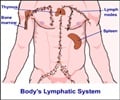Scientists from Sydney's Centenary Institute have successfully filmed the working of the body's immune system with the help of multi-photon microscopy.
With the help of multi-photon microscopy, scientists from Sydney's Centenary Institute have successfully filmed the working of the body's immune system.
It would provide critical insights for future vaccine design and could potentially improve current vaccinations.The research team led by Professor Wolfgang Weninger, head of the Immune Imaging program at the Centenary Institute has filmed an immune cell becoming infected by a parasite, and followed the infection as it begins to spread throughout the body.
"Using multi-photon microscopy, we studied dendritic cells in the skin. Under normal conditions we found the cells in the epidermis (top layer) were static, whereas in the dermis (second layer) they were very active, moving around as though seeking out pathogens," said Professor Weninger.
"Once we established this, it was fascinating to introduce the Leishmania infection and watch as the parasite was picked up by the cells and the process by which it began to spread throughout the body," he added.
Leishmaniasis is a disease that causes skin sores and can affect internal organs such as the spleen, liver and bone marrow. If left untreated, it can be fatal.
"We now have a general idea of how pathogens are recognised by the immune system and which cells are involved," said Weninger.
Advertisement
"On the other side of the story, scientists can now visualise the pathway of current vaccines in the immune system, providing greater understanding and the potential for refining current interventions against disease," he added.
Advertisement
"The Hubble allowed the universe to be seen with absolute clarity, which wasn't before possible from earth.
"This is exactly the same as multi-photon microscopy - it provides a unique and innovative view of cells, unveiling a whole new understanding of how immune processes work," he said.
The study is published in PLoS Pathogens.
Source-ANI
SPH











